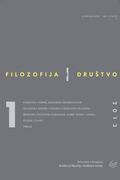Perverzija i metoda. Žižekova platonska ljubav“ za film, dijalektika egzemplifikacije i katastrofa psihoanalize u kinematičkom diskursu filozofije
Perversion and Method. Žižek’s ‘Platonic Love’ for Film, Dialectics of Exemplification and the Catastrophe of Psychoanalysis in the Cinematic Discours
Author(s): Borislav MikulićSubject(s): Philosophy
Published by: Institut za filozofiju i društvenu teoriju
Keywords: academic correctness; ‘sublime’ exemplifications; paradigmatic vs analogical transference; holism of sense; totalitarianism of discourse; contingency of subject; cinematic materialism; end of psychoanalysis
Summary/Abstract: The article discusses the relation between the paradigmatic status of film and use of film analogies in the psychoanalytic discourse on society and culture by Slavoj Žižek, which represents the very ground of his philosophical discourse in general. In the first part, starting with a recent discussion by different English and American scholars on controversial aspects of Slavoj Žižek’s activity in academia and on a broader public scene, the paper discusses on some parallel examples and inherent motivators of the formcontent controversy in philosophy and pop-culture as well as Žižek’s interpretation of his position. In the second part, the article discusses Žižek’s sporadic meta-reflection on exemplification and provides arguments for the thesis that, in Žižek, on the ground of his ontology of the virtual, one encounters a double conception of ‘inherence’ (paradigmatic and analogical) between instance and principle, its consequence is a shift in the use of film examples from analogy of objects to analogy of analyses, which invents a typical conflict between the metonymic and metaphorical evasion of discourse. On this background, the article reexamines the general contention against Žižek of a ‘virtual totalitarianism’ without contingency of meaning and sense, and points to the position of the subject withoutdiscourse as another ground for the condition of analysis of truth. In the third part, the paper analyses and evaluates Žižek’s own understanding of his cinematographic illustrations and his peculiar, performing and self-referential, method of resolving the epistemological problem of film interpretation through imaginary identification or ‘empathy’ with film objects. In the fourth part, the paper discusses the apparent asymmetry between Žižek’s application of psychoanalytic doctrines onto film criticism, on one side, and, on the other, his little elaborated apotheosis of so-called ‘cinematic materialism’. It is argued that this asymmetry ultimately causes what Žižek rejects in principle: a substitution of materialism and contingency of truthsearch for a holism of sense. Consequently this seems to turn the psychoanalytic discourse on cinematography into a hermeneutic one.
Journal: Filozofija i društvo
- Issue Year: 24/2013
- Issue No: 1
- Page Range: 381-422
- Page Count: 44
- Language: Croatian

